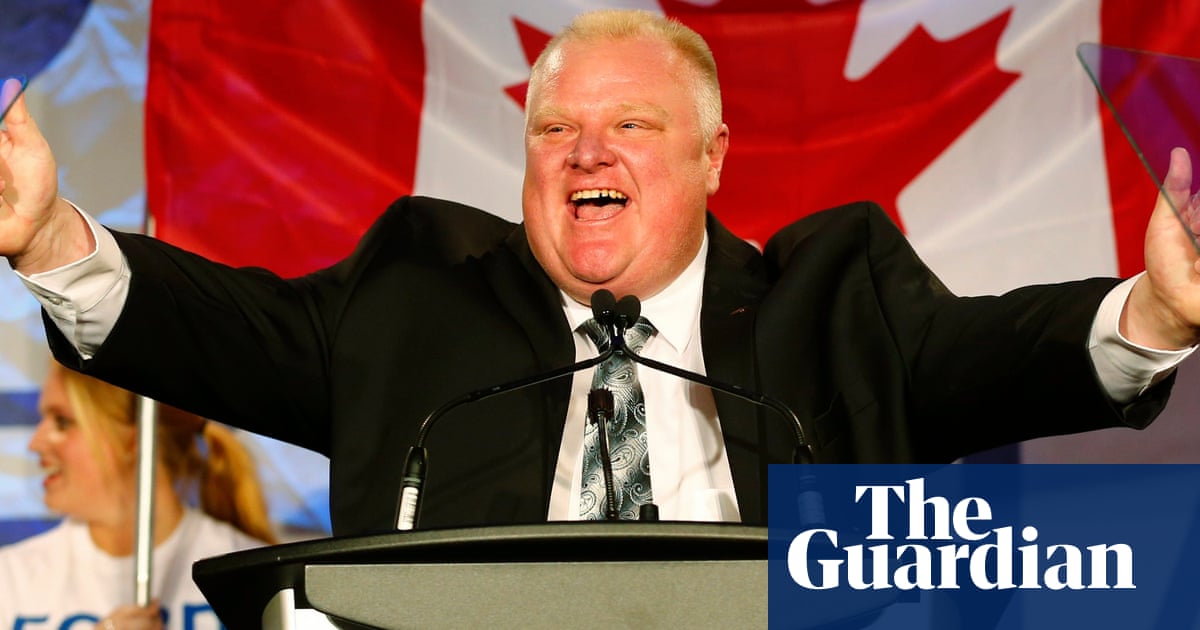Canadians make bad decisions too. For proof, see this schadenfreude-fuelled documentary aboutRob Ford, the bellicose former conservative mayor of Toronto. Ford’s rolling scandals in office include public drunkenness, smoking crack with gun-runners, and lying about everything. Talking heads in the documentary, sensitively titled Trainwreck: Mayor of Mayhem (Netflix, from Tuesday 17 June), remember him as “an everyman … without a shred of credibility … who turned city hall into a circus”. That seems unfair. Circuses aren’t that bad, and I refuse to believeevery mansmokes crack cocaine.
Most documentaries wring every ounce of lurid detail from their subjects. This guy has more chaos than fits inside 49 minutes. We do get thrillingly grainy footage of him twirling his crack pipe, slurring first-degree murder threats with Mortal Kombat-levels of specificity, and making bizarre rants in Jamaican patois, against what or whom I’m not sure. First-hand sources are film-maker’s gold, and Ford is happy enough to spend his lowest points around people who video everything. These people never have good phones though, do they?
There isn’t space to do more than mention Ford’s extensive legal and domestic troubles, nor critique his executive choices, which included voting against grant money for HIV programmes, removing bike lanes and declaring transit workers an emergency service so they couldn’t strike. In one council meeting, Ford reportedly stated: “Those oriental people work like dogs.” He later apologised for the remark, which he had intended as a compliment.
Shamelessness and emotional dysregulation are fantastic traits for reality TV; at some point they became necessary for public office too. Trainwreck feels like a rear-view mirror on that turning point. Ford swings between joking around, puce-faced outrage and meek apology. He resembles a baby, which makes strange sense. If it’s unfair to attack appearance, let’s just say he was a voluptuous blond, and voters in the western world have a type. It is impossible to imagine a woman or an ethnic minority candidate getting away with one of the bad decisions Ford compulsively makes. Those folks can’t even wear tan.
The story – and our glee in watching it – is complicated by the fact that Ford is a casualty of addiction issues. The question of who, how and when we forgive is a live one. Does it make a difference if the wrongdoer demands we move on, as Ford does? His popularity remained high. He would have been re-elected but in 2014, was diagnosed with an aggressive abdominal tumour anddied in 2016. That same year Trump was elected president. There’s a sick familiarity to the way controversies bounce off the Canadian mayor. The way he demonises the media as liars when he knows another scandal is about to break. The way he is able to position himself as a victim, and voters eat it up.
There is an attempt at balance. “I’m proud to show this side of the story, and … why I stood by him through thick and thin,” says his former head of security. The Rob-Ford-was-a-good-man argument here hinges upon a story we’re told about a time the mayor was buying himself a Subway sandwich. Upon learning there was another order waiting but no driver, Ford delivered the stranger’s sub himself. Doesn’t make him Nelson Mandela, does it? By his own reckoning he made $35 plus three bucks as tip. Why does he have that much time in the day?
Trainwreck shows Ford going door to door, asking people if their fridge freezers are working correctly, and taking a water-jet to graffiti. That’s not governing; that’s being a handyman. We all need to be more serious about public office. While politics will always be about public perception, it shouldn’t be reduced to entertainment, and ideally should be distinguishable from true crime. Otherwise the only winner is social media clips and documentaries.
Sign up toWhat's On
Get the best TV reviews, news and features in your inbox every Monday
after newsletter promotion
No point pretending it isn’t watchable, though. I was gripped by this grainy footage, of a mayor fighting the public, or ploughing into an elderly female councillor, while barrelling across the chamber floor in a state of agitation. He might have been on his way to the Speaker’s podium, to rip off his shirt and yell: “Are you not entertained?” I was. I’m not proud of it.
